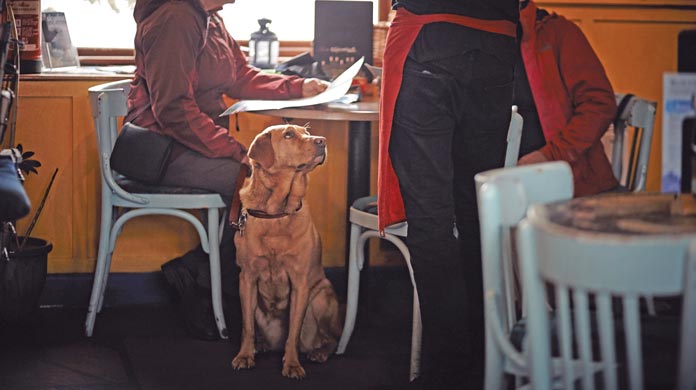
Article contributed by Mohammad Shihabi, Ellenoff Grossman & Schole LLP
This year, many New York City restaurateurs were left surprised when a New York City administrative law judge ordered a Manhattan-based restaurant to pay substantial fines for implementing a strict no-pets policy at the restaurant. In 2017, a guest attempted to enter the restaurant with his service dog. Rather than serve the guest, the restaurant requested the guest to provide proof that the dog was registered as a service animal and then asked the guest to leave after he could not provide the requested paperwork.
After the incident, the New York City Commission on Human Rights had an undercover tester call an affiliated restaurant and, after inquiring about service animals, discovered that the restaurant would not allow any dogs in the establishment. In doing so, the restaurant argued incorrectly that doing so would be a violation of New York’s health code and laws.
The restaurants were fined a total of $64,000 dollars by a New York City administrative law judge. So where did the restaurants go wrong?
Federal, State and Local Laws Prohibit Discrimination against Individuals with Disabilities
The Americans with Disabilities Act, the New York State Human Rights Law, and the New York City Human Rights Law all prohibit restaurants and other places of public accommodation from discriminating against individuals with disabilities, including denying them services because the individual has a disability. That prohibition extends to individuals with disabilities who bring their service dogs onto the restaurant’s premises. Although animals are typically not allowed in restaurants, the NYC Health Code explicitly provides that service animals are allowed in restaurants and other food establishments.
What Can’t Restaurants Do About Service Animals?
Discrimination against individuals with service animals can come in many forms. Prohibited acts include:
- Refusing to allow an individual with a disability and their animal to enter the restaurant’s premises, obtain goods or dine at the restaurant.
- Requiring patrons to pay an extra fee or charge for having a service animal present.
- Denying service to an individual with a service animal because of other patrons’ or staff members’ allergies or fear of animals. Generally, allergies or fear of animals by fellow patrons or staff members is not a basis for denying access or refusing service to people that require service assistance.
- Asking about the individual’s disability.
- Requiring medical documentation from the individual.
- Requiring a license, special identification card, training documentation, or other certification from the individual for the animal.
- Asking the animal to demonstrate its ability to perform a specific task.
So What Can Restaurants Do?
Generally, restaurants have few options and must allow service animals into their restaurants. When a patron arrives with a service animal, restaurants are only permitted to ask the following two questions:
- Is the service animal required because of a disability?
- What work or task has the service animal been trained to perform?
If the patron’s description of the service animal’s work or tasks relates to a disability, such as blindness, deafness, or other impairments, the service animal must be allowed in the restaurant. However, restaurants are not required to care for, supervise, feed or provide a special location for the animal. A restaurant may also require that the service animal is harnessed, leashed, or tethered, unless doing so would interfere with the service animal’s work or the individual’s disability. If that is the case, the individual must maintain control of the animal through voice, signal, or other effective controls.
Restaurants may only ask an individual with a disability to remove their service animal from the premises if it is out of control and the handler does not take effective action to control it, or it is not housebroken or otherwise causes a nuisance. However, in doing so, the restaurant must offer the individual with a disability an opportunity to obtain the goods or services without the service animal’s presence. Restaurant management would be wise to document any notable interaction involving a service animal in the same way other notable guest interactions are documented.
Restaurants may also charge a customer if the customer’s service animal causes damage to the restaurant. However, in doing so, the restaurant must also charge other customers for causing the same type of damage, regardless of whether the customer is an individual with a disability or a service animal.
What About Restaurant Employees?
Federal, state and local laws also require that employers accommodate their own employees’ needs for service dogs in the workplace. So what should an employer do?
The important thing is you must treat the employee’s request like any other request for reasonable accommodations for a disability. For New York City employers, that means following the City’s fairly new “Cooperative Dialogue” procedures. The New York City Commission on Human Rights has released guidelines for employers seeking more information on the “cooperative dialogue” requirement, available at their website.
If you have any questions regarding service animals or the New York City “cooperative dialogue” process, please be sure to contact a reputable and knowledgeable attorney.
 Mohammad Shihabi is an Associate in the Labor & Employment practice group at Ellenoff Grossman & Schole LLP in New York City. He represents and advises clients on a wide range of labor and employment matters, including on employment contracts, response to workplace complaints, and the conduct of workplace investigations, discrimination, harassment, retaliation, leave, accommodation and wage and hour issues. He also regularly defends clients in federal and state court and before various governmental agencies. He can be reached by phone at 646-895-7226 or by email at mshihabi@egsllp.com
Mohammad Shihabi is an Associate in the Labor & Employment practice group at Ellenoff Grossman & Schole LLP in New York City. He represents and advises clients on a wide range of labor and employment matters, including on employment contracts, response to workplace complaints, and the conduct of workplace investigations, discrimination, harassment, retaliation, leave, accommodation and wage and hour issues. He also regularly defends clients in federal and state court and before various governmental agencies. He can be reached by phone at 646-895-7226 or by email at mshihabi@egsllp.com























